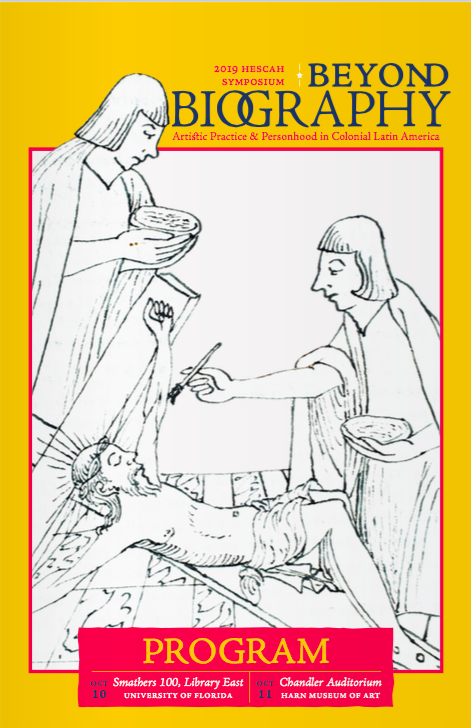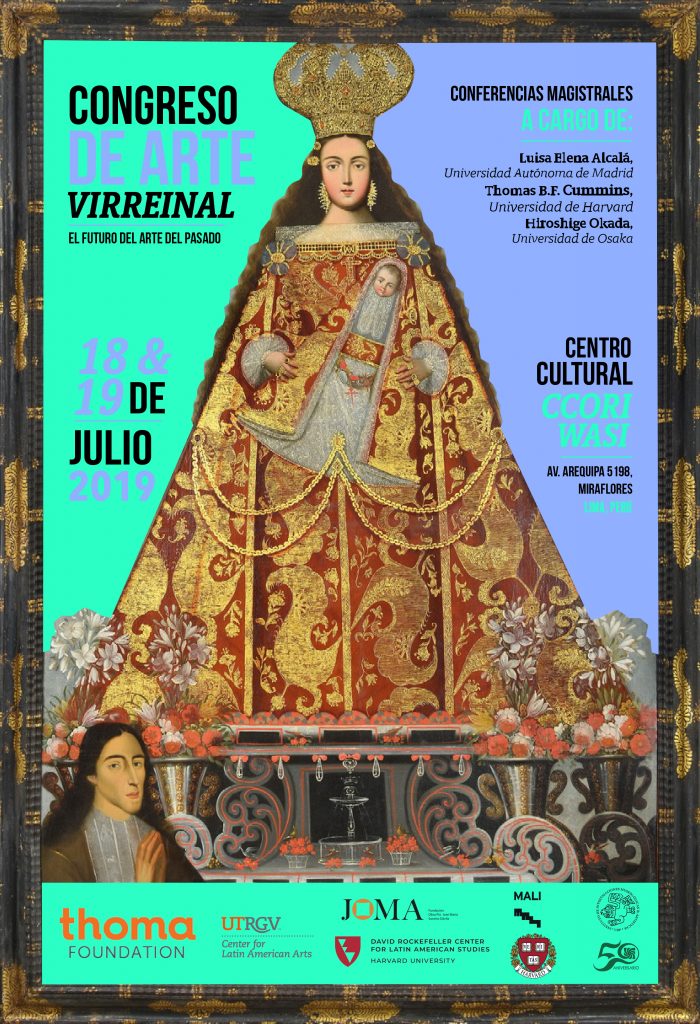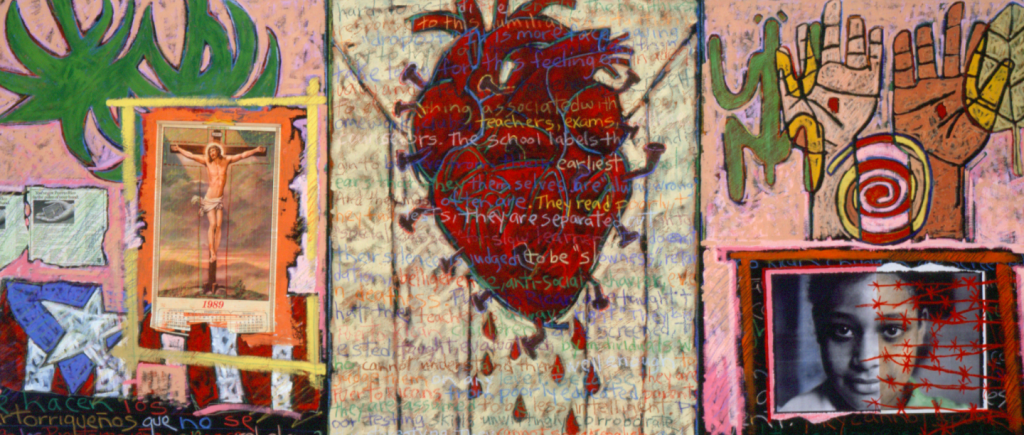
Now showing at the University of Florida’s University Gallery:



Apply now for a fellowship to support your research. Crystal Bridges invites applications addressing a variety of topics including American art history, architecture, visual and material culture, Indigenous art, Latin American Art, American studies, craft and contemporary art that expand traditional categories of investigation into American art. Projects with an interdisciplinary focus are encouraged.
The program is open to scholars affiliated with a university, museum, or independent holding a PhD (or equivalent) and PhD candidates. Scholars are selected based on potential to advance understanding of American art and intersect with Crystal Bridges’ collections, architecture, or landscape.
Terms range from six weeks to nine months. Tyson Scholars have access to the art and library collections of Crystal Bridges and the University of Arkansas library. Housing is provided near Crystal Bridges. Workspace at the museum is also provided. Stipends vary depending on duration of residency and experience, and range from $15,000 to $30,000 per semester. Additional funds for relocation and research travel funds are also available.
For more information, visit: http://crystalbridges.org/tyson-scholars/. Applications open November 1st, 2019. Deadline for the 2020-2021 academic year is January 15, 2020.
October 10, 2019 / 6:00 pm / University of Florida, Smathers 100, Keynote Lecture by Dr. Susan V. Webster
October 11, 2019 / 9:30 am – 5:00 pm / University of Florida, Harn Museum of Art, Additional Speakers

What was the nature of artistic work in colonial Latin America? This symposium gathers leading scholars to think about artistic subjectivity without focusing on names or “life’s work.” We will consider artistic personhood and practice within social structures, in relation to medium, and as determined by gender, age, and race. We strive for a greater understanding of colonial Latin American art itself, as well as of the human agency that brought it into being.
A Claim for Craft in the Development of Artists’ Rights
Maya Stanfield-Mazzi, Associate Professor of Art History, University of Florida
The Artist-Cartographers of the Uppsala Map of Mexico-Tenochtitlan (c. 1540)
Jennifer Saracino, Assistant Professor of Art History, Flagler College
Angelina Martina: A Tlatelolca Merchant or a Feather Artisan?
Margarita Vargas-Betancourt, Latin American and Caribbean Special Collections Librarian, University of Florida
The Power of Expertise: Artists as Arbiters of the Miraculous in Colonial Latin America
Derek Burdette, Assistant Professor of Art History, University of Florida
Academic Ambitions in New Spain
Aaron M. Hyman, Assistant Professor of Art History, Johns Hopkins University
The Face of the Virgin and the Hand of the Artist: Thinking about Anonymity in Colonial South America
Emily Floyd, Lecturer in History of Art, University College London
Art-Making and Art-Breaking in the Era of Tupac Amaru
Ananda Cohen-Aponte, Associate Professor of Art History, Cornell University
CFP: College Art Association, Annual Conference, Chicago, February 12–15, 2020
Deadline for paper proposals, July 23, 2019
Delia A. Cosentino, DePaul University
Barbara E. Mundy, Fordham University
More than any other nation in the Americas, Mexico has confronted the enduring artistic legacy of past eras–be they Zapotec sculptures unearthed in Oaxaca, sorrowing Virgins in side chapels of Baroque churches, or Porfirian-era public monuments–and from this has built narratives about the past. The selection and sequence takes on particular pressure during anniversaries–favored opportunities to think about the shape of time past. Given that the year 2020 marks a set of Mexican anniversaries– the years 1520 (Spanish-Aztec War), 1820 (Independence), and 1920 (Revolution), we invite papers that examine how Greater Mexico’s past has been configured and reconfigured over time through specific assemblages of and/or within objects and artworks. In seeking papers that address a diversity of subject matters and moments across time, we invite reflection on these questions: How do choices of such assemblages by artists, scholars, leaders, and/or patrons reflect and reshape the politics of a given moment? What is the relation between archeological assemblage and art historical narrative? What is the role of the context [or frame]–be it tomb, church, home, or museum–on Mexico’s assembled past?
Please email your paper proposal, CV & CAA proposal form by July 23, 2019 to dcosent1@depaul.edu and mundy@fordham.edu
You may download the CAA form here:
Session at the College Art Association CAA2020 annual conference, 12-15 February 2020, Chicago
Chairs: Elize Mazadiego (emazadiego@ucsd.edu) and Eve Kalyva (e.m.kalyva@gmail.com)
In 2017, the exhibition Radical Women: Latin American Art, 1960-1985 opened at the Hammer Museum, UCLA as part of Getty’s Pacific Standard Time initiative: LA/LA. The exhibition presented works by 120 women artists active in Latin America and the United States, claiming to be the “first survey of radical and feminist art practices in Latin America and among Latina artists in the United States.”
Working back from this exhibition, this session seeks to examine the representation and construction of “Latin America”, “Latin American art” and more specifically “Latin American women” through a survey of exhibition histories and strategies of display. In the case of Radical Women, curators Cecilia Fajardo-Hill and Andrea Giunta focused on the heterogeneity of postwar feminist artistic practices, adding specificity to the topic of global feminisms in art while countering the dominant narrative of Western and of particularly U.S. feminism.
This panel invites discussion on how the framework of feminism can help explore, counter, complicate and (re)construct Latin American identities and art histories. What particular gaps in knowledge and access to it do shows that focus on women artists aim to fill, and how do they upset canonical readings of (Western) art history? What nuances arise from using the framework of feminism, and what alternative frames of reference and readings of Latin American women have become available? Since new perspectives should ideally avoid the pitfalls of the past, how can exhibitions negotiate and resist the objectification of genders and identities? If art exhibitions can generate critical dialogue, how is this achieved and reflected in exhibition design and public engagement, and how does curatorial research inform scholarship?
To submit a paper proposal, please use CAA’s proposal form found at https://caa.confex.com/caa/2020/webprogrampreliminary/meeting.html.
Proposals should be 250 words max, and accompanied by a 2-page CV. Please send your proposals directly to the session chairs Elize Mazadiego (emazadiego@ucsd.edu) and Eve Kalyva (e.m.kalyva@gmail.com)
Deadline to submit a paper proposal: 23 July 2019
Conference presenters must be CAA members. Notifications for selection will be sent out by 22 August 2019.


On View April 11 – September 29, 2019
Curated by Susanna V. Temkin, El Museo’s Curator, and co-organized by Noel Valentin, El Museo’s Permanent Collection Manager
In celebration of its 50th anniversary, El Museo del Barrio presents Culture and the People: El Museo del Barrio, 1969-2019, a two-part exhibition featuring selections from the Permanent Collection and a timeline contextualizing the history of the institution with related archival materials. The exhibition will reflect on the institution’s activist origins and pioneering role as a cultural and educational organization dedicated to presenting and preserving Latinx and Latin American art and culture. The exhibition borrows its title from an essay penned by one of the Museum’s founders and its first director Raphael Montañez Ortíz, who outlined his concept for the institution in a 1971 article published in Art in America.
In addition to the two part-exhibition Culture and the People, El Museo will initiate a cycle of exhibitions dedicated to the Museum’s Permanent Collection in 2020. The cycle will focus on specific works from the collection, including room-size installations and in-depth bodies of work, enabling El Museo’s curators to work directly with artists, scholars, and conservators to uncover new research and grant further public access to the Museum’s Permanent Collection.

Long before the arrival of the Spaniards, the people of South America had a system of recorded information that was portable, precise, and so complex that it remains undeciphered today.
The long-lived Wari Empire and vast Inka Empire employed sophisticated devices called khipu to record information, such as census data and labor obligations. Made of cords, both Inka and Wari khipu seem to have recorded not only quantitative or statistical content, but narrative information as well. The variation in cord structures, colors, wrapping patterns, and knots encoded and conveyed information, while the basic khipu elements—flexible knotted cords—offered a lightweight and compact means of transporting information across distances.
This exhibition is the first to bring together examples of Wari, Inka, and Colonial khipu. Less than a dozen complete Wari khipu are known to exist in museum collections, and three will be on display at Dumbarton Oaks, along with interactive displays that will help visitors understand the way khipu worked, how they were made, and how information was encoded.
Juan Antonio Murro, Assistant Curator of the Pre-Columbian Collection, is curating this exhibition with Jeffrey Splitstoser, PhD, an expert on Wari khipu and ancient textiles and Assistant Research Professor of Anthropology at George Washington University.
– From doaks.org. Click here for more information.
Thanks to member Anne Cassidy for the information below!
This is a good year for Mesoamerican manuscript studies at the CAA conference in New York this week, with two back-to-back sessions.
On Thursday, 2:00 – 3:30 in the Bryant Suite on the 2nd floor there will be: Painted Books of Pre-Hispanic Mexico: New Discoveries
Panel speakers: Dr. Merideth Paxton (University of New Mexico) The Opossum and the Uayeb in the New Year Pages of the Madrid Codex
Dr. Susan Milbrath (University of Florida) Yearbearer Imagery in Postclassic Codices: Thresholds of Time and Space
Dr. Gabrielle Vail (University of North Carolina) Cultural Interactions in Late Postclassic Mesoamerica: Exploring the Repainted Pages of the Codex Vaticanus B and Cognate Almanacs of the Maya Madrid Codex
Dr. Élodie Dupey (Universidad Nacional Autónoma de México) The Chromatic Palettes of the Codex Vaticanus B: Characterization and Analysis in the Framework of the Mesoamerican Manuscripts’ Color Technologies
Dr. Jennifer Saracino (Flagler College) Indigenous Artistic Process & Collaboration in the Mapa Uppsala (c. 1540)Immediately afterward, 4:00 – 5:30 in the Grand Ballroom East on the third floor, Dr. Elizabeth Hill Boone (Tulane University) will be named this year’s CAA Distinguished Scholar in a special session. Dr. Boone’s distinguished work in the area of Mesoamerican manuscripts has been a major contribution to Mesoamerican studies.
Also, for those of you interested in modern and contemporary Latin American art, Kaira Cabañas has a book release event:
FROM:
ANTHOLOGY FILM ARCHIVES
BOOK RELEASE EVENT!
KAIRA M. CABAÑAS’S “LEARNING FROM MADNESS: BRAZILIAN MODERNISM AND GLOBAL CONTEMPORARY ART”
Kaira M. Cabañas’s “Learning from Madness” offers an invigorating series of case studies that track the parallels between psychiatric patients’ art works in Western Europe and its reception by influential artists there, to an analogous but altogether distinct situation in Brazil. The book also explores how this “outsider art” continues to raise important questions in the contemporary global art circuit. Cabañas turns to the films of Javier Téllez, an artist who compellingly engages the history of psychiatry and the legacy of creative expression within it.
To celebrate the release of “Learning from Madness,” Cabañas and Téllez will be here in person to host a special event. The evening will feature a short reading, as well as a screening of Tellez’s film CALIGARI AND THE SLEEPWALKER (2008). A reception will follow the screening in the AFA lobby.
“Learning from Madness: Brazilian Modernism and Global Contemporary Art” is published by the University of Chicago Press, 2018. A representative from the University of Chicago Press will be on site to sell books.
Looking forward to seeing you at these events!
Below is a short list of ALAA-sponsored sessions and meetings taking place during the upcoming College Art Association (CAA) conference in New York, February 13-16 that will be of interest to members.
“Open Sessions for Emerging Scholars of Latin American Art” (Association for Latin American Art ALAA)
Time: Friday, February 15, 2019: 4:00 PM – 5:30 PM
Location: New York Hilton Midtown – 2nd Floor – Clinton Suite
Chairs: Theresa Avila, CSU Channel Islands; Arden Decker
Spectacle of Stone: The Art of Passage in the Ancient Maya Landscape Catherine H. Popovici, The University of Texas at Austin
Global Import: Implications of Transnational Conflicts in the Art of Juan Manuel Echavarría and Doris Salcedo Jamie DiSarno, University at Buffalo
Art in an Age of Crisis: Women Artists and the Mexican War on Drugs Alberto McKelligan Hernández, Portland State University
ALAA Business Meeting: Awards! Elections! Announcements! Snacks provided! Bring your own beverage!
Time: Thursday, February 14, 2019: 12:30PM–2:00PM
Location: New York Hilton Midtown – 4th Floor – New York
The CAA on-line schedule is now searchable https://caa.confex.com/caa/2019/meetingapp.cgi. Simply select “Latin America,” “Latinx,” or “Caribbean” from the “subject area” menu on the left hand side, and a list of relevant sessions appears.
We hope to see you there!